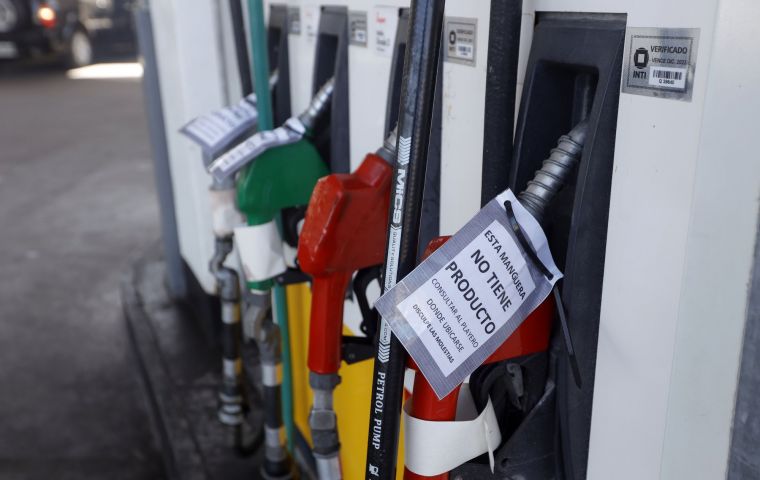MercoPress. South Atlantic News Agency
Fuel shortages reported in Argentina
 YPF implemented on Monday an average increase of 3%
YPF implemented on Monday an average increase of 3% Due to fuel shortages in several parts of Argentina, some pumps were forced to sell only up to a quota per customer while others simply closed their activities on Thursday, it was reported in Buenos Aires.
Despite recent price increases to maintain competitiveness amid a volatile currency exchange crisis, poor supply affected the Autonomous City of Buenos Aires (CABA), the northern provinces, Córdoba, and Mar del Plata, where some petrol stations have even been closed. In other cases, only premium naphtha, the most expensive variant, was available.
Passenger transport companies were also fearing future services could not be rendered if a solution was not found promptly.
The current scenario stems from restrictions on the sale of fuels imposed by oil companies on Monday despite a sale price agreement with the national government. The companies claim the current price of a liter of super naphtha is at its lowest value against the dollar in at least the last 10 years.
The state-owned YPF implemented on Monday an average increase of 3% in fuel prices in all its stations nationwide in a move to reduce the price gap with the other retailers. It was the first increase by the oil company since a virtual price freeze in mid-August after the primary elections and the 22% devaluation of the peso. At that time a 12.5% increase by other companies was acquiesced by national authorities after an agreement not to modify prices until after the national elections.
Meanwhile, Argentine Customs discovered a fuel smuggling maneuver leaking fluids to Paraguay from Clorinda, in the province of Formosa through unauthorized border crossings. The maneuver consisted of acquiring the fuel through fictitious buyers and bringing it to border towns without being detected.
Due to fuel shortages in several parts of Argentina, some pumps were forced to sell only up to a quota per customer while others simply closed their activities on Thursday, it was reported in Buenos Aires.
Despite recent price increases to maintain competitiveness amid a volatile currency exchange crisis, poor supply affected the Autonomous City of Buenos Aires (CABA), the northern provinces, Córdoba, and Mar del Plata, where some petrol stations have even been closed. In other cases, only premium naphtha, the most expensive variant, was available.
Passenger transport companies were also fearing future services could not be rendered if a solution was not found promptly.
The current scenario stems from restrictions on the sale of fuels imposed by oil companies on Monday despite a sale price agreement with the national government. The companies claim the current price of a liter of super naphtha is at its lowest value against the dollar in at least the last 10 years.
The state-owned YPF implemented on Monday an average increase of 3% in fuel prices in all its stations nationwide in a move to reduce the price gap with the other retailers. It was the first increase by the oil company since a virtual price freeze in mid-August after the primary elections and the 22% devaluation of the peso. At that time a 12.5% increase by other companies was acquiesced by national authorities after an agreement not to modify prices until after the national elections.
Meanwhile, Argentine Customs discovered a fuel smuggling maneuver leaking fluids to Paraguay from Clorinda, in the province of Formosa through unauthorized border crossings. The maneuver consisted of acquiring the fuel through fictitious buyers and bringing it to border towns without being detected.




Top Comments
Disclaimer & comment rulesCommenting for this story is now closed.
If you have a Facebook account, become a fan and comment on our Facebook Page!